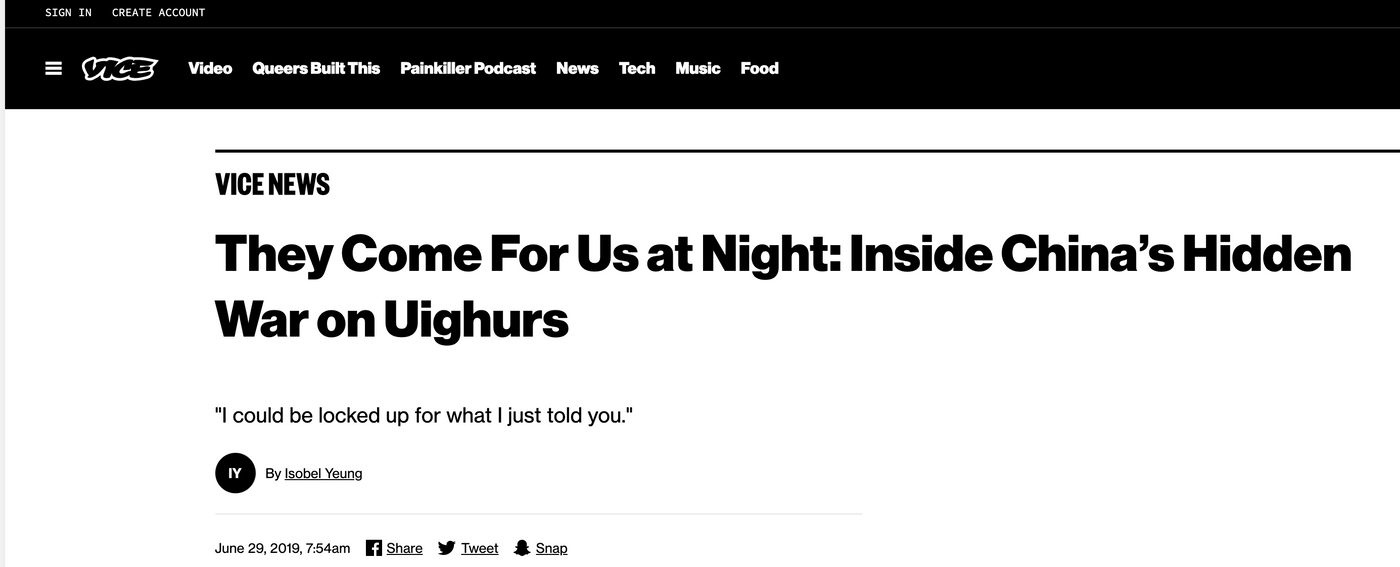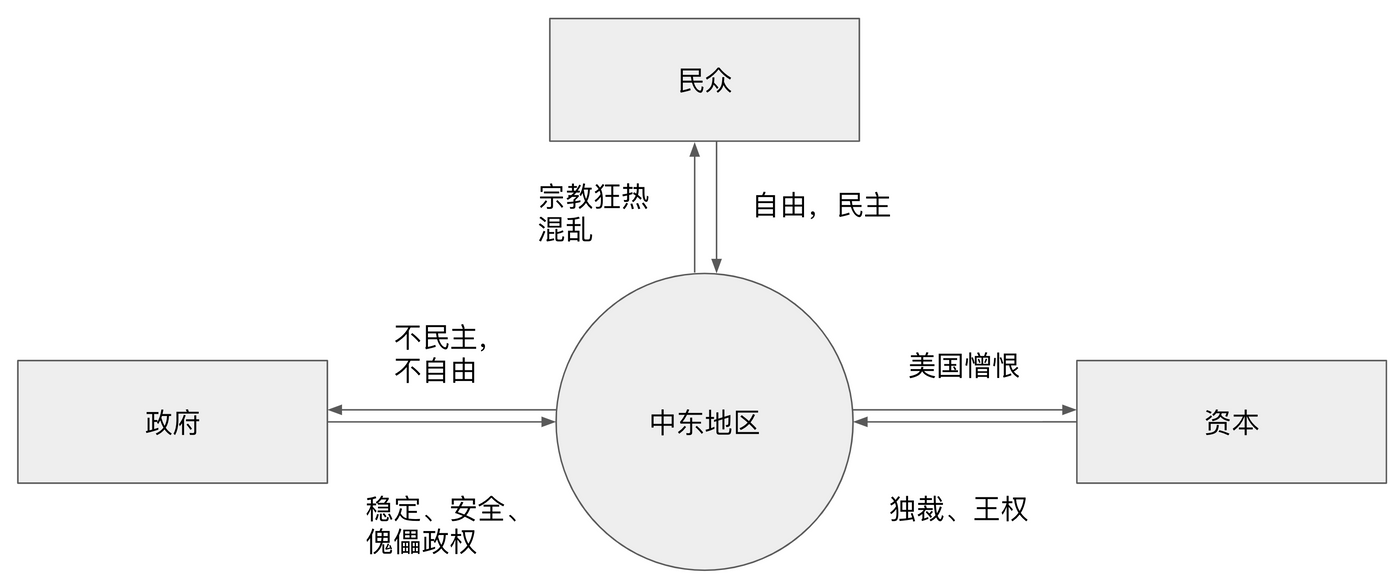
自由的代价是永远的警惕(The price of freedom is eternal vigilance)。霍瑞肖,天地之間有許多事情,是你的睿智所無法想像的(There are more things in heaven and earth than you've ever dream of, Horatio)。
America's triple fear and anger toward China
Last night, I had the pleasure of attending the birthday party of a Silicon Valley solid-state memory executive. Because of the pandemic, I moved to my parents' house an hour away from school. The executive is a friend of his parents. Because of the epidemic, he couldn't hold a grand birthday party, so he only invited a few close family members.
At the birthday party, I had the pleasure of chatting a few words with this executive who was born and raised in China. He is very interested in politics, so I asked him a few political questions: 1. Will the relationship between China and the United States continue to deteriorate; 2. What are the reasons for the deterioration of Sino-US relations? His answer to the first question is: No, because as long as the Democratic Party or Biden takes office, Sino-US relations will ease up. The answer to the second question is: The deterioration of the relationship is just an "illusion", because Trump needs an election and deliberately makes a tough stance toward China to cover up his incompetence and weakness in his domestic epidemic control policy.
I tried my best to hide my disappointment with this answer, while also understanding that in his circumstances and identity there are things he either can't say or believe, but at least in my opinion his answer is inaccurate. In his view, the confrontation between China and the United States is a temporary campaign strategy, rather than an outbreak of long-term political contradictions between China and the United States. The relationship between China and the United States will definitely continue on the current path in the future. As long as the deep-seated problems behind the deterioration of the relationship are not resolved, it has nothing to do with who is the president.
American politics is a troika: the people, the government, and the capitalists. The wills of these three clash over the United States—by contrast, Chinese politics is a carriage: Party rule—and everything revolves around it, whether it’s the occasional “listening to public opinion” or “anti-corruption advocacy.” Integrity", even "the construction of the rule of law", and "national unity", the ultimate core is to maintain the party's rule - as to whether the maintenance of the party's rule will ultimately "benefit the people", this is beyond my ability to predict and the scope of this article's discussion, and therefore not discussed. American politics is relatively complicated. The people, the government and the capitalists, these troikas often have "same bed and different dreams", but once they think of a piece, they will act very quickly. To analyze America's foreign policy toward China, we must judge from the direction of the troika. Let's start with the "people".
The American "people" can be reduced to voting machines. After all, the election of politicians depends on the votes of the people, so whether it is "capitalists corrupting elections" or "media deceiving the people", they must succeed in the end. This "coaxing" must continue until voters can. Until the moment you cast your vote - is it easy to do? Not just pressing a button anyway. The Chinese media are also deceiving the people every day. I think even the pink people don't believe the words of the news broadcast, right?
However, the "people" here does not actually refer to a specific person, but refers to the goals and social atmosphere of American society, that is, "freedom", "democracy", "equality", "fairness" and "justice". Maybe the United States can't do any of them, but this does not prevent it from becoming the goal of American society and people. Just like in China now, not everyone can share Jack Ma's wealth, but it will not prevent everyone from taking "socialism" (social wealth and resource sharing) as the goal of Chinese society. If an American politician comes out to openly support "dictatorship" and "centralization", the public will definitely not support this politician.
In the past ten years, China's international image has gradually become equated with "dictatorship" and "centralization" - this may be deliberately smeared by foreign media, but at least it is "smeared" based on facts, not Pure nothingness. Whether it's Vice News Tonight's coverage of Xinjiang entering Xinjiang, where they captured footage of police arresting Xinjiang Uyghurs in the middle of the night ( link ), or the chemical precursors that China allowed to manufacture Fentynal until 2019, An industrial chain of manufacturing these chemicals in China, importing them in Mexico, synthesizing them, and finally shipping them to the United States has formed. When the U.S. Drug Enforcement Administration notified China in 2018 to arrest these makers of suspected drug crimes, China refused to arrest, citing insufficient evidence ( link , link (China reluctant to arrest two fentanyl drug lords)).

These widely disseminated news will make any reader form a "moral" anger against China, creating an image of an authoritarian, deliberate and harmful to the national interests of the United States. Once popular sentiment is established, politicians can start harvesting, using anti-China stances to win people's votes. The first carriage was so angry at China's undemocratic, unfree and human rights issues.
The second carriage was the US government. The U.S. government and all governments in the world exist for similar purposes—to maintain national security, to eliminate threats—what is a threat to the United States? Any country that is not an ally of the United States, or a country with dissent, is a threat to the United States. In this regard, the frequent intervention of the US government in Middle East politics in the past 50-60 years can reflect that the US government's diplomatic strategy is based on "fear". Such "fear" keeps the US diplomatic strategy in a state of "alertness". The US foreign policy in the Middle East is almost like a lump of mud, unable to support the wall. It is precisely because the troika of US politics has the same bed and different dreams, with the consequences of different demands. The American people want to bring democracy and freedom to the people of the Middle East - but the consequence of democracy is that religious fanatics control the government, promote hatred of the United States, and endanger the "sense of security" of the US government's carriage. At the same time, the third carriage "capitalists" wants to ensure energy supply, and the chaos brought about by democracy is not as stable and effective as the tyranny and dictatorship. Therefore, the third carriage supports the dictatorship, but if it supports the dictator, it will make the people at the bottom of the Middle East. Hate the United States even more, and continue to weaken the "sense of security" of the US government. In simple terms, it can be drawn as the following diagram. If you want to learn more, you can read an article by the United States on the Middle East think tank: link . The consequence of this is that no matter what, it is impossible to create a situation in which the troika is satisfied.

Under the current situation, as China's national strength has gradually increased, and it has fought with the US military in history (North Korea, Vietnam), it is unlikely to bring a sense of security to the US government. Therefore, based on fear, the US government will definitely see China as a future threat growth point.
Next came the last carriage, and perhaps the most important one in American society: the "capitalist." American capitalists do not have any moral considerations. American multinational corporations are not "American" corporations, these corporations have no nationality and will not be loyal to the United States, but only to their shareholders and profits. During World War II, the Nazis used the slave labor of Jews in concentration camps to produce a lot of cheap goods, and many American companies rushed to buy them and then import them into the United States-because slave labor would bring them higher profits ( link ), and morality Forget it. Without the involvement of the U.S. government's Commerce Department, this spontaneous buying behavior would have continued.
The capitalist collective is also the most terrifying existence in American society - secretly rigging elections and giving politicians large campaign funds. Although it can't completely influence the election, it also has a huge influence. In order to resist such influence, the US government has long fought against these companies - the greatest feat was in 1911, when Rockefeller's thriving Standard Oil was directly dismembered. It also nearly broke up Microsoft in 2001. This tradition has also been learned by European governments, which launched a lawsuit against Apple in 2016, demanding a huge tax burden - the EU female politician who led the case, Margrethe Vestager, is also known as the "Dragon Slayer" (Dragon Slayer). Of course, multinational companies often don't give the U.S. government a good look—for example, Apple refuses to ask the U.S. government to help unblock the iPhone.
From this perspective, capital and the government have a love-hate relationship. Neither party has absolute power. At the same time, capital focuses on interests, so naturally, it will often follow the government's instructions. This is the essence of cooperation between foreign multinational capital and the Chinese government—sometimes the Chinese government is reckless and puts forward a lot of requirements, such as the proportion of Sino-US joint ventures, or regulatory requirements, as long as the fundamental interests are not damaged, for short-term profits , foreign capital agreed.
This kind of "open one eye, close one eye" and "love and hate" relationship continued until around 2015, when the Chinese government began to put forward "intellectual property" requirements, these multinational capitals began to be vigilant. Remember the driving force behind these capitals? Not freedom, not democracy, but "not only to make money now, but also in the future". In the 21st century, "primitive capital" is no longer a factory or even a worker, but "intellectual property". The Chinese government around 2015 required Sino-foreign joint ventures that intellectual property should be owned by China if the R&D was done in China ( link ). This point involves the core interests of this group of capitalists. Although Observer.com and People's Daily Online have refuted this view, capitalists are not the people and will not be manipulated by "public opinion", they can only see real money. The real damage to the interests cannot be erased by the refutation in black and white.
At the same time, rising labor wages in China have made contract processing less affordable. At the same time, the trend of "supporting American workers and buying American products" has begun to form in the United States, so it has also reduced the willingness to use Chinese factories. This type of economic analysis has been done by many people, such as this report . Interestingly, all these analyses have "official" rebuttals. But still, you can refute that sentence, but words cannot be turned into money out of thin air. As long as there is less money in the pockets of the capitalists, it is useless to say more.
Another case of capital damage is in Hollywood. The U.S. cultural industry has always been a magic weapon for the world to attract gold, and it has also absorbed many American cultural and intellectual elites. China's censorship system has been controlling Hollywood through capital means - if the film does not meet the review standards, it is not a simple "cutting" issue, but will not be introduced. In recent years, the movie itself is not even important anymore. If the movie star or the production unit has "humiliated China", it will also have an impact on the distribution - for example, Dwayne Johnson was forced to apologize to the Chinese audience in Chinese , this incident Made him a laughing stock in America. In China, on the one hand, domestic audiences have obvious aesthetic fatigue for American blockbusters, and Hollywood movies can no longer enter the box office charts. Domestic films such as "Changjin Lake", "Wolf Warrior" and "Wandering Earth" are more suitable for Chinese audiences; on the other hand, the publicity mode of Hollywood films is out of line with domestic ones, and blockbuster plots with special effects are difficult to produce with middle-aged and elderly moviegoers. Interaction and resonance - but the chance of Hollywood art film introduction is almost zero. On the U.S. side, The Heritage Foundation issued a report in 2018 warning of the impact of Chinese censorship on Hollywood. The famous satirical animation South Park also produced an animation to describe the report - this animation contains a scene where a Chinese officer enters the town of South Park, a protagonist (Stan) writes the script while the officer reads it. , then grabbed his computer, began to edit, and then let him continue to write.

In 2020, only 16% of the box office in China's film market went to Hollywood films. This figure was still 36% in 2019 ( link ), and in earlier years, Hollywood films accounted for a much higher proportion of the box office. When Hollywood management can't continue to make a lot of money in the Chinese market, they will no longer control the output of these "cultural elites" - these "pens" will start to produce works that criticize or oppose China, and further The ideology that affects the American people.
In general, the attitude towards China and the troika of the United States has become surprisingly consistent: the people are against China because of freedom and democracy; the government is against China because of national security; the capitalists are against China because there is no better way to make money in China interests, and Chinese operations may cost them their interests. From this point of view, once the Troika reaches a consensus, it will be separated from the "party" and the "president". Whether it is Trump or Biden, the US policy towards China will not change easily. Perhaps in terms of "rhetoric", Biden will be more moderate, but the direction of actual action will not change dramatically.
Unless China can instigate one or both of the troikas—such as allowing multinational capital to gain more benefits—the consequence will be the collapse of national enterprises, the resentment of the people at home, and endangering the long-term rule of the party. Or simply change to a democratic system, declaring "homosexuality" and other political ideologies to move closer to the West - this is almost impossible. At present, many online public opinion's analysis of the United States tends to focus on "capitalists", exaggerating the influence of capitalists on American society, imagining the US government as a passive puppet, and the people as brainwashed lambs. Such an analysis is not unreasonable, but it exaggerates the power of the capital group—Trump and Congressional rebellion are all signs of people’s resistance. Although there is no need to agree with these people’s views, as long as the capital group does not touch the voting machine or vote system, three carriages will never be one carriage.
For any issue, when these troikas are in the same bed, the United States will be indecisive and difficult to make a move-unless there is a very courageous government or president who can overcome all opinions and change the country in a destructive way. At this point, in the United States It is also very rare in history, such as Lincoln - when all the people were against the emancipation of black slaves, and all the capitalists were against the emancipation of black slaves, he did this with fox-like cunning and tiger-like momentum. So did President Lyndon Johnson, who betrayed his Southern identity and ushered in a new era in America by shrewdly getting a Congress that didn't support it to pass the Civil Rights Act (prohibiting racial discrimination and segregation). The complexity of American democracy cannot be summed up in a simple "that's all". Democracy in the United States is more like a stable system with multiple interests sharing.
But unfortunately, on the issue of China, the troika has gone from the same dream at the beginning to the current one, which means that in the short term, the field of cooperation between China and the United States will become more and more narrow, and the sense of hostility will become more and more. powerful. The US policy towards China will not change anytime soon.
Like my work?
Don't forget to support or like, so I know you are with me..
Comment…